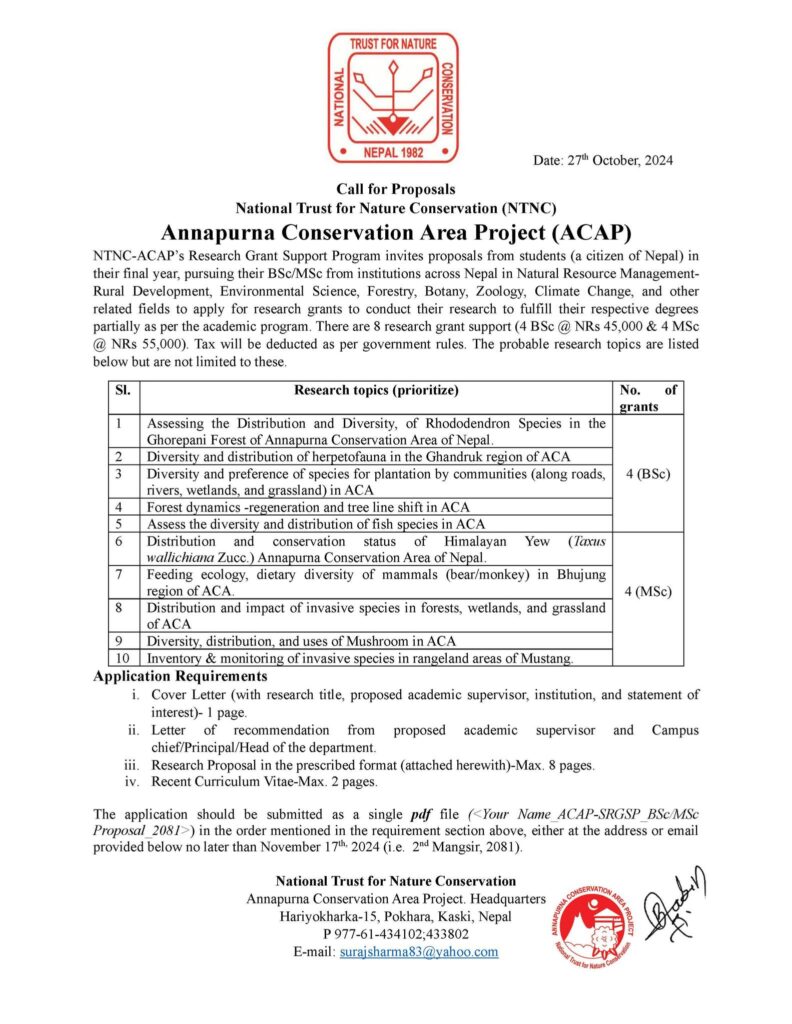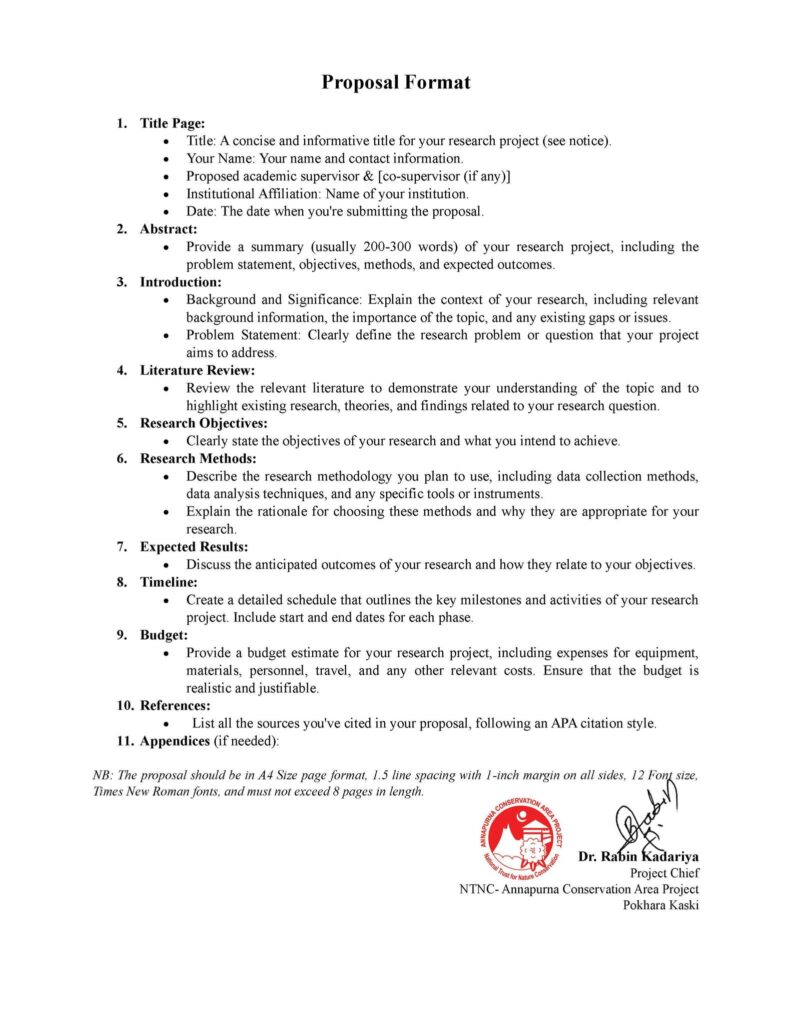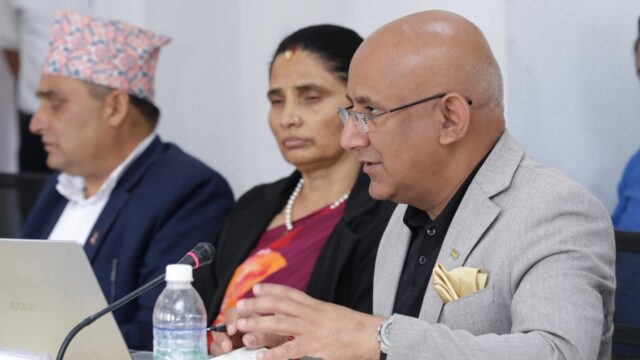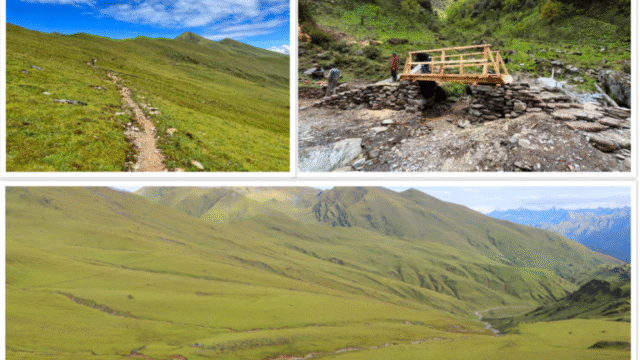The National Trust for Nature Conservation’s Annapurna Conservation Area Project (NTNC-ACAP) is calling for research proposals from final-year Nepali students pursuing BSc or MSc degrees in fields related to conservation and environmental sciences. The Research Grant Support Program, aimed at encouraging research in natural resource management, rural development, environmental science, forestry, botany, zoology, and climate change, offers financial support to help students fulfill degree requirements through hands-on conservation research in the Annapurna Conservation Area (ACA).
Research Grant Details
NTNC-ACAP is providing eight research grants under this program—four for BSc students and four for MSc students. BSc researchers will receive grants of NRs 45,000, while MSc researchers will be awarded NRs 55,000. Taxes will be applied according to government regulations. Research topics prioritized for this grant include, but are not limited to:
i. Diversity of Rhododendron Species in the Ghorepani Forest, ACA – Assessing the distribution and diversity of these iconic plants.
ii. Diversity and Distribution of Herpetofauna in Ghandruk Region, ACA – Studying reptiles and amphibians to understand their ecological roles.
iii. Community-Preferred Plantation Species – Examining plant diversity along roads, rivers, wetlands, and grasslands in ACA.
iv. Forest Dynamics and Tree Line Shift in ACA – Investigating changes in forest structure and growth patterns.
v. Fish Species Diversity in ACA – Assessing species distribution to inform conservation strategies.
vi. Conservation Status of Himalayan Yew in ACA – Studying the distribution of Taxus wallichiana Zucc., a valuable medicinal plant.
vii. Feeding Ecology and Diet Diversity of Mammals in Bhujung, ACA – Understanding food habits of mammals like bears and monkeys.
viii. Impact of Invasive Species in ACA – Analyzing the effects of invasive species on local forests, wetlands, and grasslands.
ix. Diversity, Distribution, and Uses of Mushrooms in ACA – Documenting edible and medicinal mushrooms.
x. Inventory and Monitoring of Invasive Species in Mustang Rangelands – Identifying and managing invasive plant species.

Application Requirements
To apply, students must submit the following documents as a single PDF file, titled in the format “Your Name ACAP-SRGSP BSc/MSc Proposal 2081,” no later than November 17, 2024 (2nd Mangsir, 2081):
i. Cover Letter – One page stating the research title, academic supervisor, institution, and applicant’s interest.
ii. Letters of Recommendation – From both the academic supervisor and the campus department head.
iii. Research Proposal – Maximum of 8 pages following the outlined proposal format.
iv. Curriculum Vitae – Up to 2 pages highlighting academic and research experiences.
The completed proposal should be submitted to the NTNC-ACAP email or physical address provided in the official notice.

Proposal Structure
The proposal must be comprehensive yet concise, covering the following sections:
i. Title Page – Research title, name, supervisor’s details, institution, and submission date.
ii. Abstract – A 200-300 word summary outlining the research problem, objectives, methods, and expected outcomes.
iii. Introduction – Background information, significance, and a clear problem statement.
iv. Literature Review – Summarizing existing studies relevant to the topic.
v. Research Objectives – Clear objectives of the research project.
vi. Research Methods – Detailed methodology, including data collection and analysis techniques.
vii. Expected Results – Anticipated outcomes aligning with the research objectives.
viii. Timeline – Project milestones and schedule for each phase of the research.
ix. Budget – Estimated expenses with justifications for each cost.
x. References – All sources cited in the proposal, using APA style.
xi. Appendices (if necessary).
Proposals must adhere to formatting guidelines: A4-sized pages, 1.5 line spacing, 1-inch margins, 12-point Times New Roman font, with a maximum length of 8 pages.
Supporting Conservation Research in ACA
The NTNC-ACAP Research Grant Support Program aims to foster academic exploration and research-based solutions within the Annapurna Conservation Area. By supporting young researchers, NTNC-ACAP hopes to contribute to sustainable conservation efforts, address biodiversity challenges, and encourage future professionals in natural resource management.
Source: NTNC- ACAP






